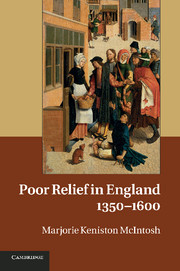Book contents
- Frontmatter
- Contents
- Acknowledgements
- Notes on conventions and online resources
- Abbreviations
- 1 Introduction
- Part I Late medieval and early Tudor patterns
- Part II Profound change during the early Reformation period
- 5 New ideas and new policies, c. 1530–1553
- Part III Intensified problems and altered approaches in the later sixteenth century
- Part IV Responding to the problems
- Appendices included in the printed volume
5 - New ideas and new policies, c. 1530–1553
Published online by Cambridge University Press: 05 January 2012
- Frontmatter
- Contents
- Acknowledgements
- Notes on conventions and online resources
- Abbreviations
- 1 Introduction
- Part I Late medieval and early Tudor patterns
- Part II Profound change during the early Reformation period
- 5 New ideas and new policies, c. 1530–1553
- Part III Intensified problems and altered approaches in the later sixteenth century
- Part IV Responding to the problems
- Appendices included in the printed volume
Summary
The years between around 1530 and 1553, containing the early stages of the English Reformation, were marked by worsening poverty that demanded attention, new attitudes towards the poor, and experimental governmental policies about how they should be treated. Many earlier forms of aid were eliminated during these years as secondary consequences of a series of royal and Parliamentary decisions based nominally upon spiritual factors but heavily influenced by economic and political considerations. The dissolution of the monasteries and convents in 1536 and 1539 was followed by the termination of chantries in 1545 and 1547 and of religious fraternities in 1548. The buildings, lands, and other property of these bodies were appropriated by the crown and usually sold eventually to lay owners, and the charitable projects they had run – including hospitals and almshouses – were closed. Within parishes, religious images and prayers for the dead were abolished, and after several years of advance warning, any stocks of money, animals, or land associated with proscribed Catholic practices were confiscated early in 1553, together with all goods beyond those needed for a simple Protestant service. Those changes eliminated the auxiliary religious organizations previously based in local churches as well as many of the activities and possessions that had helped to define parish identities.
The pressures caused by mounting poverty and decreasing assistance were addressed and to some extent mitigated by a cluster of new practices introduced by the government and church. They stemmed from three closely related forces: a desire among people influenced by humanist or “commonwealth” thinking to build just and equitable social and economic relationships, led by the state and based upon the labor of all of the country’s residents; the idealistic commitment of early Protestant leaders to creating a more truly Christian and charitable community, one in which unfortunate people would not suffer from desperate hunger or the need to beg; and the heightened willingness of Parliament, often cooperating with royal advisors, to legislate about many aspects of English life. Following preliminary attempts in the 1530s, the state and the new Protestant church worked hand in hand during Edward VI’s short reign to tackle economic and social problems and formulate public measures to help the needy. While the decision to use parishes as the unit of implementation may perhaps have been influenced by their previous role in distributing alms, more powerful was the pragmatic consideration that parishes were the only still active administrative bodies that spanned the whole country. For local churches and their officers, a required role in charitable assistance helped to counteract the damage to their prior self-image that resulted from religious closures and confiscations of property.
- Type
- Chapter
- Information
- Poor Relief in England, 1350–1600 , pp. 115 - 138Publisher: Cambridge University PressPrint publication year: 2011



